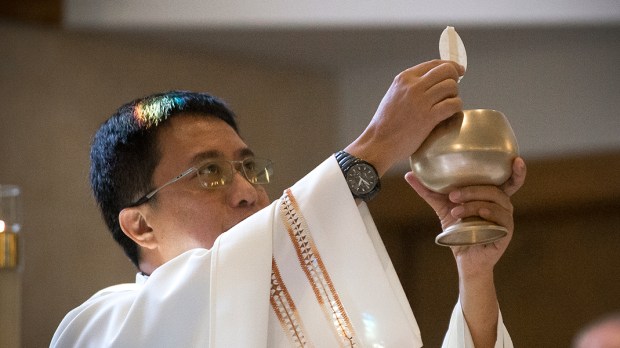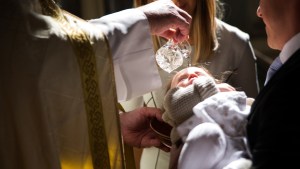Lenten Campaign 2025
This content is free of charge, as are all our articles.
Support us with a donation that is tax-deductible and enable us to continue to reach millions of readers.
Recently the Archbishop of Kansas City, Joseph Naumann, issued a letter to priests of his diocese to remind them of the requirements for what kind of wine may be used in the Mass. The letter included a warning that if certain kinds of wine had been used, the Masses would have been invalid. This would have dire consequences: The intentions for those Masses would have gone unfulfilled, and Christ would not have been made present in the sacrament for those attending.
What could have been “wrong” with the wine? The Catechism tells us that grape wine must be used in the Mass (CCC 1412), and the Code of Canon Law further explains that the wine “must be natural from the fruit of the vine and not spoiled” (Canon 924.3). Further, a 2004 Instruction from the Vatican, Redemptionis Sacramentum, states that the wine “must be natural, from the fruit of the grape, pure and incorrupt, not mixed with other substances” (RS 50).
The problem, Archbishop Naumann wrote, is that many wines that are sold commercially do not meet this simple standard. Rather, they often “contain additives such as elderberry extract, sugars, alcohol, etc” which could make the matter invalid for the Mass. He then instructed his priests to use only those wines which they knew to be pure.
This story has often been met on social media with bemusement, perplexity, and occasionally anger. Why should it matter whether a few other elements are added into the wine? Is God not powerful enough to turn wine with some extra sugar into the blood of Christ? Why is the Church being so fussy about this?
To understand this story, it may help to have a refresher on sacramental theology. We need to understand the meaning of the matter to know why it matters.
The sacraments are visible signs of invisible grace. They communicate to us a share in God’s own life, but they do so through physical, tangible means. This is because of the sort of creature we are, the kind God has made us to be: We are both physical and spiritual, a relation of body and soul. We are ensouled bodies, or embodied souls. When God wants to give us a spiritual gift, then, He does so through physical means.
“As a being at once body and spirit, man expresses and perceives spiritual realities through physical signs and symbols.” (CCC 1146)
Yet the means He chooses are not random. The materials used are signs: They point beyond themselves. The Latin word sacramentum first referred to the oath that a soldier swore to serve Rome and his general, which was represented by a physical mark on the body. Just so, the sacraments are physical actions that represent a spiritual reality — and make that spiritual reality come to be. There is a natural, intelligible connection between the materials used and the spiritual reality that comes to be through them.
As the Catechism puts it:
“these perceptible realities can become means of expressing the action of God who sanctifies men, and the action of men who offer worship to God. The same is true of signs and symbols taken from the social life of man: washing and anointing, breaking bread and sharing the cup can express the sanctifying presence of God and man’s gratitude toward his Creator.” (CCC 1148)
In each of the sacraments, then, there is a natural connection between the physical thing used and the spiritual reality that happens. When God wants to give us the gift of cleaning from sin, dying with Christ, and being reborn into new life in Him, He does so through the means of water. Water naturally makes us think of washing, of death (as in floods and drowning), and of life (as in the waters of birth). Water is a fitting sign for Baptism.
In the Eucharist, we are given bread and wine, which become the Body and Blood of Christ. St. Thomas Aquinas wrote that Christ gave us wheat bread because it is most nourishing and most widely available, a fitting sign for the spiritual nourishment of the Eucharist and Jesus’ promise that He would always be with us. (ST III, q. 74, a. 3, c.) He also notes that wine is fitting for the sacrament as it has something of the spiritual or divine of it, and that wine is made from grapes alone; other fruits may be fermented, but these are properly speaking not wines but liquors. (ST III, q. 74, a. 5, c.)
This last is important to note because it prompts an important question: When you add things to wine, at what point is it not wine anymore? Jesus used wine at the Last Supper and told His Apostles, “Do this in memory of me.” If they use something apart from wine, are they obeying His command? If too many additives are mixed into the wine, at what point does it cease to be wine, and thus lose its sign value in the sacrament?
How dirty could a puddle be before the water in it could not be used for Baptism? How many extras could be added to bread before it became something else (a pastry, a dessert, etc.)? If the water becomes mud, it no longer is a fitting sign for the sacrament. If the bread becomes a pudding, it no longer can be our “supersubstantial bread.” If wine becomes a mixed drink, it is no longer “the fruit of the vine” that Christ said He would drink when He came into His glory.
This is why the Church is so insistent, so specific, about the requirements for materials used in the sacraments. The sign value of the materials is an essential part of the sacramental reality. Without the proper signs, you do not have the sacrament. So, the Church asks that we keep things simple: pure water, wheat bread, grape wine. Christ instituted the sacraments, and gave us the means to celebrate them. Since “he himself is the meaning of all these signs” (CCC 1151), let us ensure we do not muddle them.


